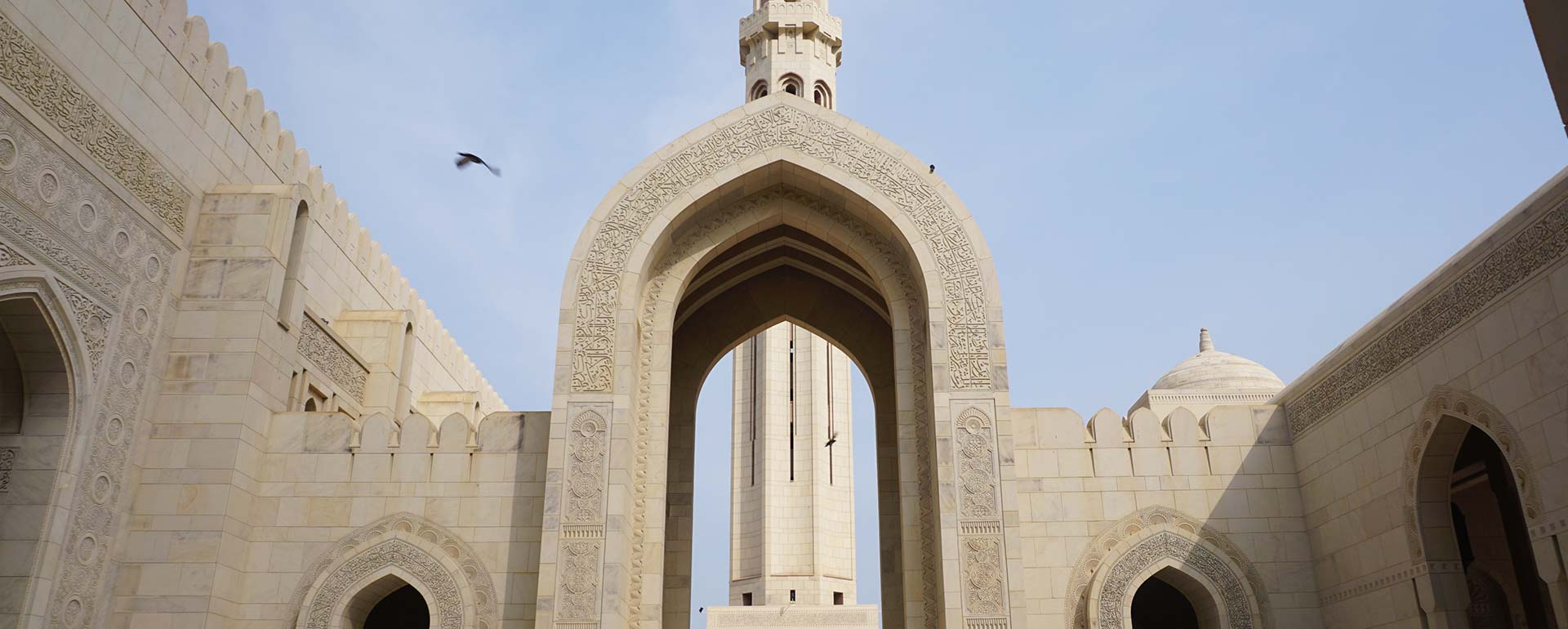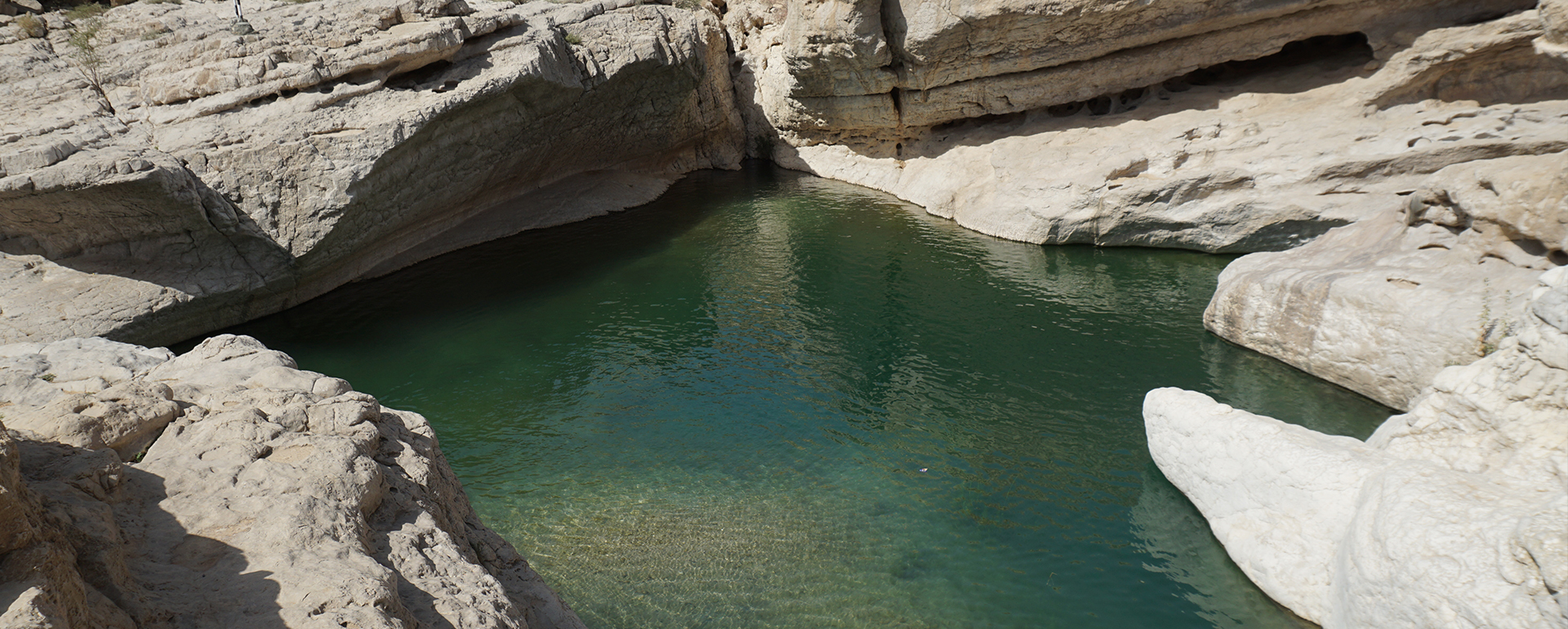- About
-
Discover
City Guides, Tour Guides, Insider's Guides
-
Experience
Book your next trip
-
Lab
Book the digital Experiences
-
Hidden Gems
Hotels. Restaurants, Bars

Editor: Silvia Vecchione
One Thousand and One Arabian Nights in a seven days’ extraordinary road trip: this can only happen in Oman, a mesmerizing dream land veiled in mystery and filled with charm, a secluded country beautifully nestled among the United Arab Emirates, Saudi Arabia and Yemen, where ancient traditions blend in with a forward-looking eye for modernity.
Though not yet a popular tourists’ choice, Oman is starting to become a hot destination for travelers coming from all over the world to discover its extremely diverse landscape and its fascinating cultural scene: pristine oasis surrounded by rocky canyons, huge palm plantations shifting towards wind-carved deserts and miles of untainted beaches encounter highly civilized cities with no trace of modernist architectural aggressions (building skyscrapers here is forbidden by the law).
Soaked in powerful scents and glowing shades, Oman is an inspiring territory managed by an open-minded government and populated by respectful people who make it one of the safest, most wonderful destinations in the whole Arabian Peninsula.
The most ancient Omani cultural heritage and traditions are securely kept within Muscat’s National Museum, located close to the harbor and the impressive Al Mirani fort, which has safeguarded the city from its invaders since the XVI century. Facing the bay, protected on both sides by forts Al Mirani and Jalali, stands Qasr Al Alam Royal Palace, magnificent in all of its grandeur. Keep in mind that no tourists are allowed to enter the building and photographs can only be taken at the entrance.
Heading east towards Sultan Qaboos Port, stop by Muttrah Souk for a very special shopping experience: located on the harbor of the old city of Muscat, the souk is built in authentic Arabian style around narrow alleys that feature small shops and kiosks on both sides, covered by a wooden roof. Here you can find any types of typical Omani goods such as traditional clothes, pottery, silver and wooden crafts, frankincense and sweets. A whole area dedicated to glittering jewelry made it famous all over the world as the “Souk of Gold”.
If the scent of spices has whetted up your appetite, Bait Al Luban may be the right choice for a scrumptious break along the way: enjoy impeccable service and yummy food (including vegetarian options) in a cozy, stylishly decorated environment with picturesque views of the harbor. Here you can get a taste of how Omani cuisine is a nice melting pot of Middle Eastern flavors mixed with Indian and North African influences.
Generally speaking, local specialties include the madrouba, a recipe based on chicken, lentils and local spices, the paplou, a soup made of basmati rice infused with lime and ginger and the shuwa, that some consider the national Omani dish, made of spicy meat wrapped into banana leaves and cooked underground for 24 hours.
As you keep making your way into the city, past Al Qurum Natural Park, take time to visit the Royal Opera House: built in 2011, it’s become the leading arts and culture organization in the Sultanate of Oman. The Grand Mosque, about 20 minutes drive from here, is the third biggest Mosque in the world. The prayer room is almost entirely covered by a huge carpet – the second largest one-piece carpet in the world – and decorated by a shimmering crystal chandelier – also the second one in the world by size.
If you wish to make Muscat your home for the night, proceed towards the bay to find the ideal place to stay: The Chedi Muscat is a luxurious property standing out for its sober elegance and timeless charm, where Omani architecture and Asian style blend into an ultra chic resort that’s tailor-made for pampering.

Now that you got a feel of Omani city life, head south towards the Arabic Sea and reach Wadi Al Shab. Even though not too easy to get to, Wadi Al Shab undoubtedly makes a thrilling adventure and an absolute must-see: after leaving the car, you need to cross the river with a small boat and walk for about half an hour along a path that leads to the first natural pool. At that point, swim for about ten minutes along the canyon to find yourself immersed in a truly magical spot where waterfalls flow into emerald green waters.
Stop by Sur for the night before venturing into the inner land. There’s not much going on in the city but it’s surely a very convenient way station to catch up some sleep and recharge. The next day, check out early in the morning to allow time for a layover at Wadi Bani Khaled while you make your way towards Wahiba Sands desert.
Among the most fascinating wadis in the country, Wadi Bani Khaled is a natural pool of crystal clear water, set among rust-red rock formations. All around, a luxuriant palm forest offers various shaded corners to shelter from the sun, giving your eyes some rest before they approach the sparkly dunes of Wahiba Sands.
Extending throughout the entire inland area of Oman, the Wahiba Sands desert, with its 10000 square km of sand, is located just 200 km southeast of Muscat. Painted in red dunes and continuously shaped by the wind, it’s even more spectacular at sunset. Experience an exciting camel ride or simply enjoy the amazing landscape from the window of your 4X4.
Tucked away in the most remote heart of the desert, 1000 Nights Camp represents the comfortable side of adventure. Indulge in your own Arabian Nights dream and wake up at dawn surrounded by thousands of glowing dunes. Contact the staff before arrival to agree on an easy pick-up point and avoid the not-to-pleasant thrill of getting lost among the dunes.
Not far from Wahiba Sands desert, Sinaw souk is arranged around a central courtyard located on the edge of town. Most lively on Thursday mornings, is the place where Bedouins gather to exchange any types of goods and grab a good bargain on livestock. Just be careful: with your eyes immersed into clouds of smoke and your mind intrigued with the buzzy atmosphere, you may end up going home with a new goat friend or a fast racing camel…just inform your airline to avoid any trouble.

Where the desert magically turns into a luxuriant oasis, lies Nizwa, the ancient capital of Oman, built around a XVII century fort that’s also one of the country’s most visited national monuments. Standing at the base of the world-famous Al-Hajar mountain range, a naturalistic Omani wonder that only comes second to Wahiba Sands, Nizwa is a gorgeous city hosting one of the oldest souks in the country.
Nestled within the fort’s walls, Nizwa souk is your can’t miss shopping opportunity: find unique souvenirs and enjoy taking pictures while strolling around a labyrinth of stalls that, most of time, do not only sell products but also manufacture them. Omani daggers, traditional clothes, silver crafts and jewelry, pottery and local food are just some of the many wonders you may find in this splendid treasure chest. For instance, Nizwa is the ideal place to stock up onto delicious dates, as the best ones in the country are grown right in this area.
To witness the folkloristic cattle market happening on Fridays, make sure you get to Nizwa very early in the morning and get ready to live an authentic Omani experience.
Located between Muscat and Nizwa, Misfat Al Abriyeen is a small village made of mud and clay, beautifully carved out of the surrounding mountains. Take a walk along the falaj – the traditional Omani canals – to admire the uniqueness of a landscape rising between terraced cultivations of lush date palms and arid rocks.
Home to some of the highest mountainous peaks of Oman, Jebel Shams, also known as the Grand Canyon of Arabia, is all hikers’ favorite place. The view from The Balcony Walk is absolutely breathtaking and totally worth the effort.
Impeccable resting place for hiking fans, The View is a classy eco-resort where luxury meets nature: located 1400 meters above sea level, it consists of panoramic bungalows hanging over the canyon and overlooking the surrounding mountains. Needless to say, The View from here will leave you breathless.
If you’re both a hopeless adventurer and a fancy traveler, choose Anantara Al Jabal Al Akhdar Resort or Alila Jabal Akhdar for an ultra high-class sojourn at equally high altitude.
If you have the chance to spend more than one week in Oman, make sure you do not miss the following destinations.

From Muscat, fly North towards Dubai to reach Khasab, a very spectacular location that’s also known as the “Oman Norway” because of its Scandinavian-looking fjords. If you’re lucky, you’ll most likely be able to spot dolphins cross the Strait of Hormuz here. Take your camera out and get ready to snap.
Located in the south of the country, Salalah is only one hour and half flight away from Muscat. Discover beautiful, sun-kissed golden beaches bathed by the Indian Ocean and wrapped by forests of palm trees while experiencing the perfect Omani seaside escape.
Among all Omani castles – there are more than 500 spread around the whole country – Bahla Fort, a UNESCO World Heritage Site, is a small fortified citadel with its own Mosque, souk and oasis, surrounded by ancient walls stretching for longer than 13 km.
Located about 100 km north of Bahla, Ibri was historically a caravan town due to its strategic position. Nearby, Ibri Castle, dated back to the XVII century, provides a unique example of local architecture.
Easy to get to from Ibri, Bat, a UNESCO World Heritage Site, is described as "the most complete collection of settlements and necropolises from the 3rd millennium BC in the world". The ancient monuments, rising from the tops of the surrounding hills, are known as "beehive tombs" because of their characteristic shape: something worth visiting for a glimpse of Omani oldest customs and traditions.